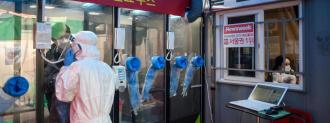A hospital in South Korea has created “phone booths” that allow medical staff to complete coronavirus tests on patients without putting themselves at risk of infection.
Seoul’s H Plus Yangji Hospital calls its innovative facilities the “Safe Assessment and Fast Evaluation Technical booths of Yangji hospital,” or SAFETY.
“It’s simple,” hospital director Kim Sang-il said, according to The Washington Post. “A patient goes inside a booth like a public telephone booth and gets diagnosed. Physicians and nurses stand outside the booth, so there isn’t contact between patients and staff.”
A New Approach to Coronavirus Tests
The hospital constructed its row of four booths for coronavirus tests within a tented outdoor shelter.
Once the patient enters one of the booths, they talk to a member of the hospital’s staff through an intercom.
If the staff member believes the person should be tested for the coronavirus, they can swab their nose and throat using arm-length gloves built into the side of the booth.
The whole process takes about seven minutes, and once completed, hospital staff disinfect and ventilate the booth before another patient is allowed to enter it.
The Benefits of Booths
The phone booths are doing more than just preventing direct contact between hospital staff and potential coronavirus carriers — they’re also making it possible for the hospital to significantly ramp up the number of coronavirus tests it administers daily during the COVID-19 outbreak.
“Our efficiency has increased almost tenfold.”
Kim Sang-il
Kim told the South China Morning Post (SCMP) that the hospital used to conduct its coronavirus tests in a single negative-pressure room — a room equipped with a ventilation system that allows air to enter but doesn’t allow potentially contaminated air to escape.
Disinfecting that room after its use took the hospital a long time, Kim said, which limited the number of coronavirus tests staff could conduct.
Cleaning the SAFETY facilities, however, is a far less time-intensive process.
“We used to take eight or nine samples a day, but our efficiency has increased almost tenfold,” Kim told the SCMP. “Now we can take 70 to 80 samples a day.”
Aside from increased efficiency, the booths also add an extra level of protection for patients.
When the hospital used a single negative-pressure room for its coronavirus tests, multiple people would often be in the room at the same time, which meant they could potentially spread the virus amongst themselves.
With the SAFETY facilities, patients are always alone.
COVID-19 Outbreak Innovations
South Korea has been one of the nations hit hardest by the COVID-19 outbreak, but it’s also been at the forefront of implementing innovative coronavirus response efforts.
In February, it opened the first drive-thru clinics for coronavirus tests, a place where people could get tested without ever leaving their cars — and without putting others at an increased risk of catching the coronavirus.
Soon after, other nations began following South Korea’s lead, opening their own drive-thru coronavirus clinics — the U.S. alone is now home to dozens of the sites.
Given the remarkable success H Plus Yangji Hospital is reporting regarding the SAFETY facilities, it might not be long before we see that model for administering coronavirus tests spread to other nations as well.






